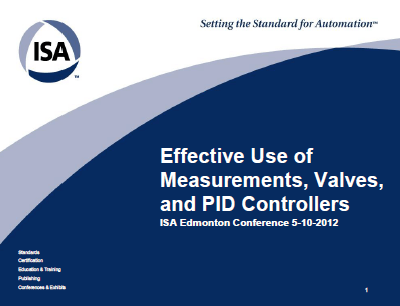 Greg McMillan, of the ControlGlobal.com Control Talk blog, is conducting a professional development course at the ISA Edmonton 2012 Exhibit & Conference, tomorrow, April 18th from 10:00 am to 5:00 pm. The title of his course is Effective Use of Measurements, Valves and PID Controllers.
Greg McMillan, of the ControlGlobal.com Control Talk blog, is conducting a professional development course at the ISA Edmonton 2012 Exhibit & Conference, tomorrow, April 18th from 10:00 am to 5:00 pm. The title of his course is Effective Use of Measurements, Valves and PID Controllers.
Greg sent me a sneak peak of his presentation and I’ll share a few items with you in case you’re not in Edmonton tomorrow. If you are there, you can register for the course here.
Greg draws his course materials from three of his books, Advanced Temperature Measurement and Control, Essentials of Modern Measurement and Final Elements in the Process Industry, and Advanced pH Measurement and Control.
The top 10 concepts Greg’s course addresses includes delay (total loop deadtime), speed (control loop, disturbances, process), gain, resonance, attenuation, sensitivity/resolution, hysteresis/backlash, repeatability/noise, offset/drift, and non-linearity. Many of concepts have been addressed in detail in Greg’s freely available demo/seminar (aka “deminar”) series.
In the course, Greg goes around the control loop starting with measurements, then on to final control elements, and then on to the controllers. In the measurement section, he provides guidance on sensor selection and installation location. He provides checklists for various measurement technologies including inline flow, pressure and DP [differential pressure], radar level, thermocouples and RTDs, and pH.
In the final control element section of the presentation, he discusses the concepts of dead band, stick-slip, rangeability and resolution, valve actuator types, valve trim responses, and limit cycles. He provides best practices to improve valve performance and concludes the section with a control valve checklist for optimum performance.
In the PID control section of the presentation, he opens with the basic concepts of PID including the proportional, derivative, and integral terms and their impact on the control loop. The concepts of open loop and closed loop time constants are review. Once the basics are covered he explores concepts including PID on error structure, setpoint feedforward, and full throttle/bang-bang control through PID control. Greg looks at how PID control can be applied to the various types of processes including self-regulating, integrating, and runaway.
He closes the course with a PID controller option checklist to help control engineers think through the process of applying the optimum PID control based on their process type and process dynamics.
If you don’t have the chance to see the presentations in person, you can learn many of the concepts through the demo/seminars and his books.
